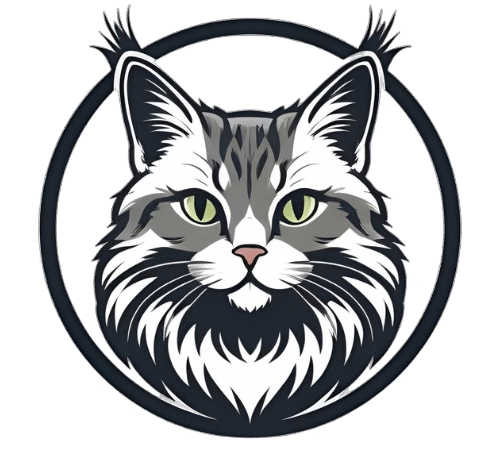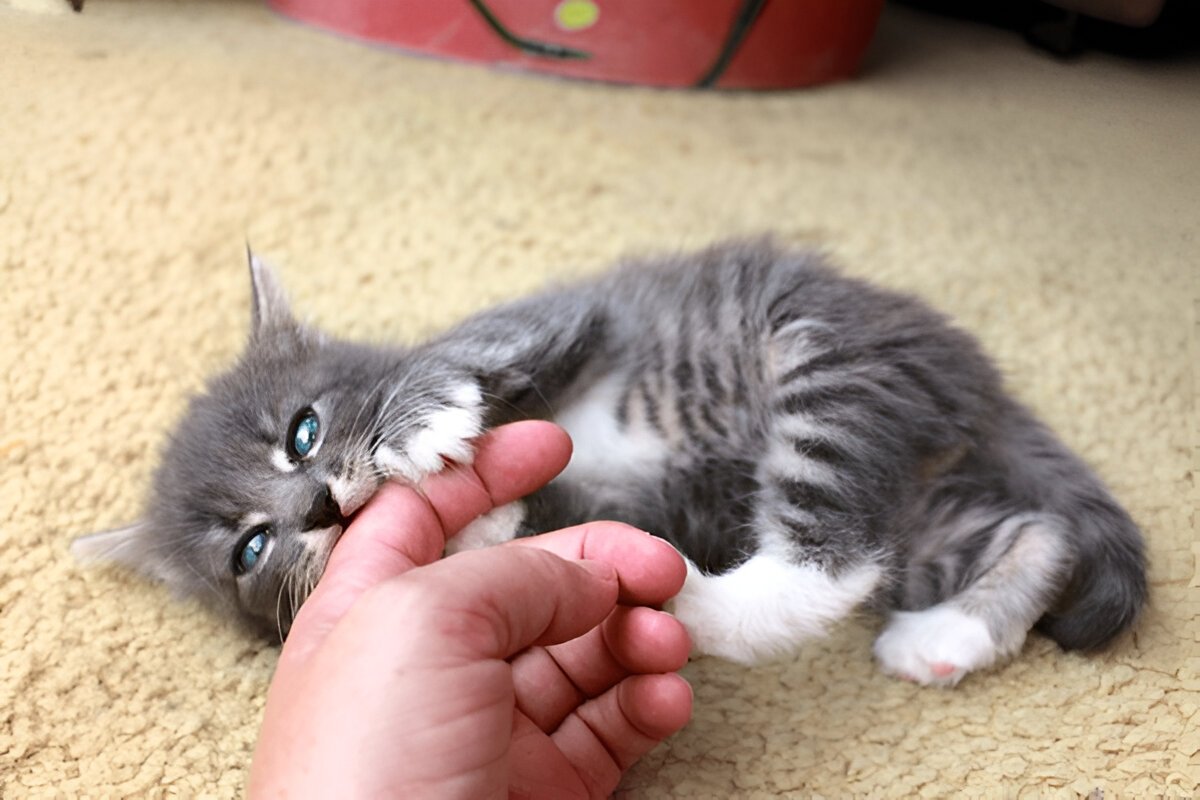If you are thinking of buying or adopting a pet but worrying about how much does Maine Coon care going to cost you? Or may not be sure how to take care of your Maine Coon kitten!
Trust me, as a Maine Coon parent, I can share this authentic experience. I have had our gentle giant, Finn, for five years, and it has been an adventure every day. If you are here because you’ve thought about getting a Maine Coon for your next pet, or because you already have one, you know what I am talking about.
Maine Coons stand out from “normal” house cats in so many ways; their personalities, quirks, and charm are huge. I promise taking care of a Maine Coon is not like taking care of a normal cat, but it is hands down one of the most rewarding experiences in a person’s life.
- Maine Coon Care: Beyond the Basics
- Maine Coon Kitten Care: Not Your Average Kitten
- Maine Coon Kitten Care Essentials Checklist
- Kitten vs. Adult Maine Coon Care: Key Differences
- Nutritional Requirements: Maine Coon Care
- Health: Proactive Care for Longevity
- Grooming Routine for Maine Coon Kittens to Adults
- Cost Comparison: Maine Coon Kitten vs. Adult Care
- Are Maine Coons high-maintenance?
- The Joy of Caring for a Maine Coon
Maine Coon Care: Beyond the Basics
Maine Coons are remarkable companions with their grand size, flowing coats, and friendly social nature. If you are a Maine Coon parent or you want to become one, understand that there are specific needs “beyond the basics” that you need to be aware of to foster a long, healthy, and happy life together.
Since they love their people so much, they do best when they are part of a family activity. Leaving a Maine Coon alone for long amounts of time may cause it to be a little blue.
Get ready for a buddy who wants to be right beside you, whether that means while you work, sit down to watch a movie, or when you’re just puttering around the house.
The Role of Early Socialization
When Finn was a tiny kitten, we opted to let him meet a lot of people, hear new sounds, and gentle touches. We wanted Finn to be a comfortable, friendly adult, and we could see that those early experiences helped a lot!
The more they are exposed to, and the more positive experiences they have when they are little, the more outgoing and well-adjusted they will be.
When we say positive experiences, we mean gentle cuddling, and exposure to new experiences (provided they are vaccinated), and preferably letting them self-explore safely. By building trust with them early, we can help them develop into calm and adaptable Maine Coons!
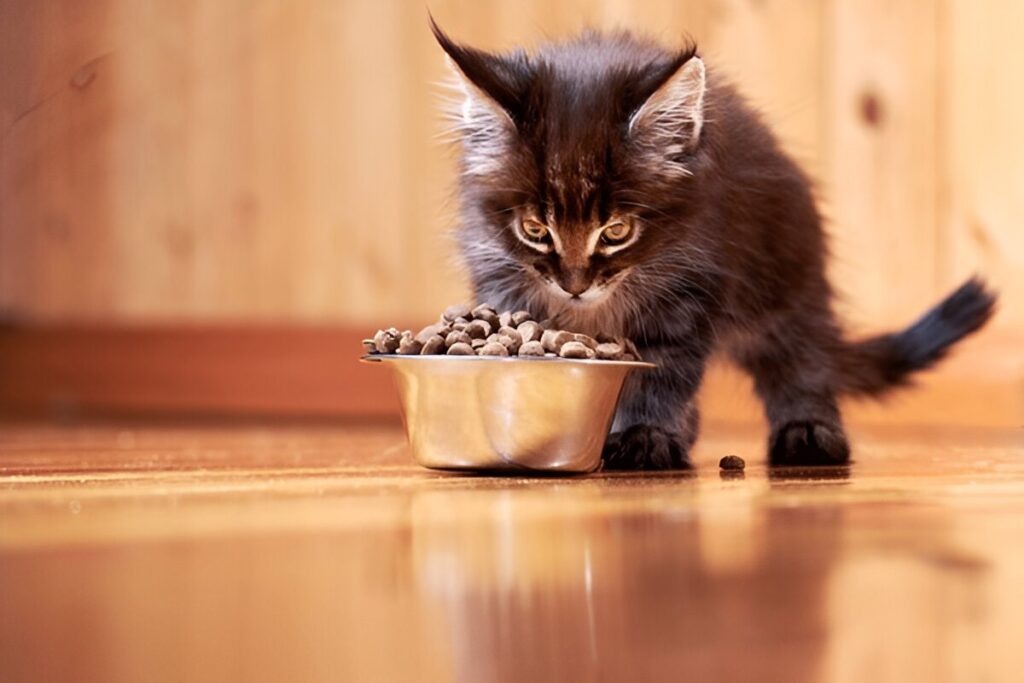
Maine Coon Kitten Care: Not Your Average Kitten
When Finn came home, he was a tiny fluff ball, but he didn’t grow nearly as fast as either of my friend’s typical tabby kittens. Maine Coon kittens grow on their own schedule, which is part of the fun!
Weekly Growth: What to Expect
Newborns (0-2 Weeks)
At this stage, they are 100% dependent on Mom, which means we should let Mom remain with them and let her keep them warm and safe.
2-8 Weeks
Between two weeks and eight weeks, their eyes will open, and they will start to wiggle around. Gentle play is recommended, as well as providing a 100% safe and cozy space. At this stage, you can start to introduce some soft sounds and textures gradually.
8 Weeks-6 Months
During these weeks, Finn almost doubled in size! This is the stage you really want to focus on feeding good quality kitten food, as all that growth is happening. This is also the time to litter train (important!), and really use playtime to begin teaching them good habits.
6 months-1 year
Finn looked like the longest, lankiest teenager during this stage. He was still growing, but was mostly filling out. This is a good stage to check in with your vet regularly to check on their development, and you can start to adjust their diet as they approach their full adult size.
Maine Coon Kitten Care Essentials Checklist
This should be similar to your shopping list as you plan to bring home your tiny furry master:
- High protein food: My vet suggested a specific large-breed kitten food for Finn so he grew at a healthy rate, but didn’t put too much strain on his joints.
- Big litter box: Seriously. They get big quickly! Start with a big one to avoid upgrading constantly.
- Scratching posts/pads: 100% required. Finn has a tall cat tree that he loves and has saved our furniture.
- Grooming tools: get a soft brush and start gentle sessions early. It gets them accustomed to it until their adult floof.
- Interactive toys: Finn is obsessed with feather wands and puzzle feeders. Kittens are very smart, so they need to think when they play!
- Safe and comfy bedding: Find a cozy spot for all those kitten naps!
Kitten vs. Adult Maine Coon Care: Key Differences
My vet gave me a similar breakdown, and it really helped me understand how Finn’s needs would change:
| Aspect | Maine Coon Kitten Care | Adult Maine Coon Care |
| Nutrition | High-calorie, protein-rich, frequent meals. They’re growing machines! | Balanced, portion-controlled meals to keep them trim. |
| Grooming | Gentle, short sessions to introduce brushes and combs. | Regular, thorough grooming for their luxurious, dense fur. |
| Socialization | Daily gentle handling, lots of new positive experiences. | Maintain routine interaction; introduce changes slowly. |
| Vet Care | Frequent check-ups, vaccinations to build up their immune system. | Annual or bi-annual wellness exams to catch anything early. |
| Play & Enrichment | Interactive toys, safe exploration for curious minds. | Larger cat trees, puzzle feeders, engaging play sessions. |
| Cost | Higher initial setup (vaccinations, spay/neuter, first round of supplies). | Ongoing food, grooming supplies, and routine vet costs. |
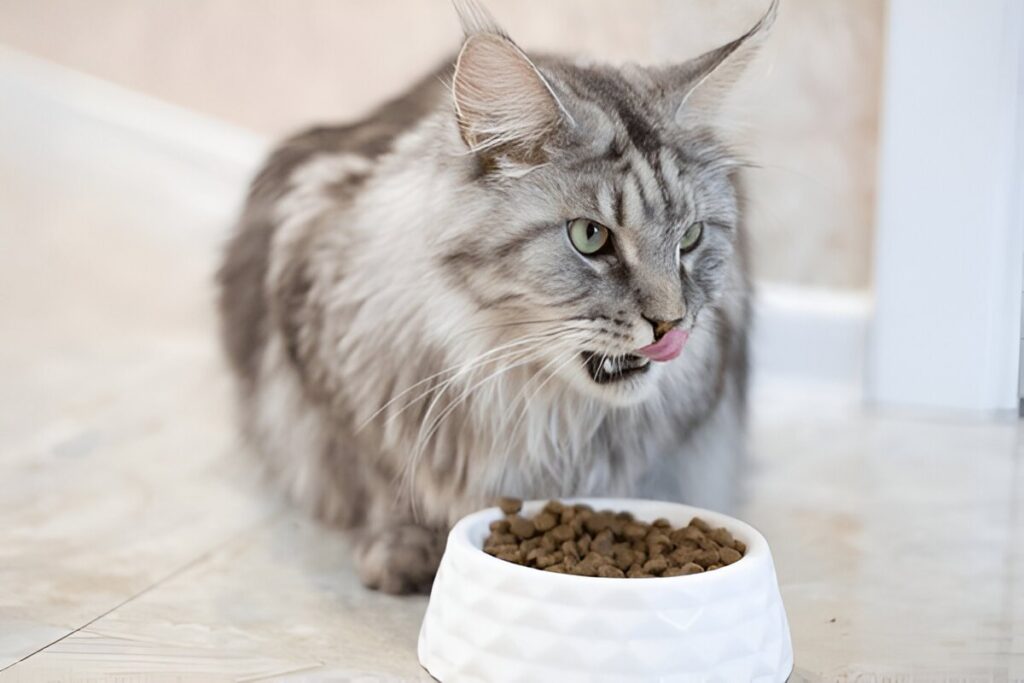
Nutritional Requirements: Maine Coon Care
Selection of the right food to properly feed a Maine Coon, especially as babies, is so important for making sure they are healthy and developing for the long haul. Due to their specific growth patterns and size, Maine Coons require special dietary attention.
When Finn was a kitten, it felt like there was a bottomless pit in front of me! It’s really important to feed your Maine Coon well, it’s so important for their long-term health.
Kitten Nutrition
Because Maine Coons take their sweet time growing, a special food needs to be fed. My vet recommended “large breed kitten“ food, which really seemed to work for Finn, while still allowing him to develop at a reasonable rate. Growing too fast for them can be tough on their joints.
A Maine Coon kitten will need approximately 50-70 calories per kilogram of body weight daily in order to support healthy growth.
Adult Nutrition
Once Finn was approximately 15 months old, we slowly transitioned him to an adult formula. Now our biggest concern is Finn’s weight.
Maine Coons can very easily become a bit chunky, which affects their joints and health as a whole.
I put measuring cups under his food so that I can control how much he is eating and change it if I think he is getting a bit fluffy.
[Source]
Kitten vs Adult Nutritional Comparison Chart
| Nutritional Aspect | Maine Coon Kitten | Maine Coon Adult |
| Growth Stage | Rapid, extended (up to 15–24 months) | Maintenance, after 15–24 months |
| Caloric Needs | High energy for growth; frequent meals | Moderate, tailored to activity and weight |
| Protein Requirement | Higher: ~30% crude protein (AAFCO guideline) | Minimum 26% crude protein (AAFCO guideline) |
| Fat Requirement | Higher for brain, skin, and energy development | Moderate, supports coat and energy |
| Essential Nutrients | Extra calcium, phosphorus, taurine, vitamins for growth | Balanced vitamins/minerals for maintenance |
| Feeding Frequency | 3+ small meals per day | 2–3 meals per day |
| Food Type | Kitten/growth formula, breed-specific if possible | Adult formula, switch after 9–24 months |
| Hydration | Fresh water always; wet food helps hydration | Same; wet food supports hydration |
| Supplements | Only if prescribed by vet | Joint supplements may help adults, consult vet |
Key Differences
Kittens require increased calories, protein, and fat to support their growth and development. Kittens or all life stages food is required, and you should switch to adult food later than most breeds—usually between 9 and 24 months old, depending on your vet’s advice.
Adults need a diet that supports muscle mass, supports joints, and prevents obesity. Quality animal proteins are still very important, but caloric/fat intake should be lower as growth slows.
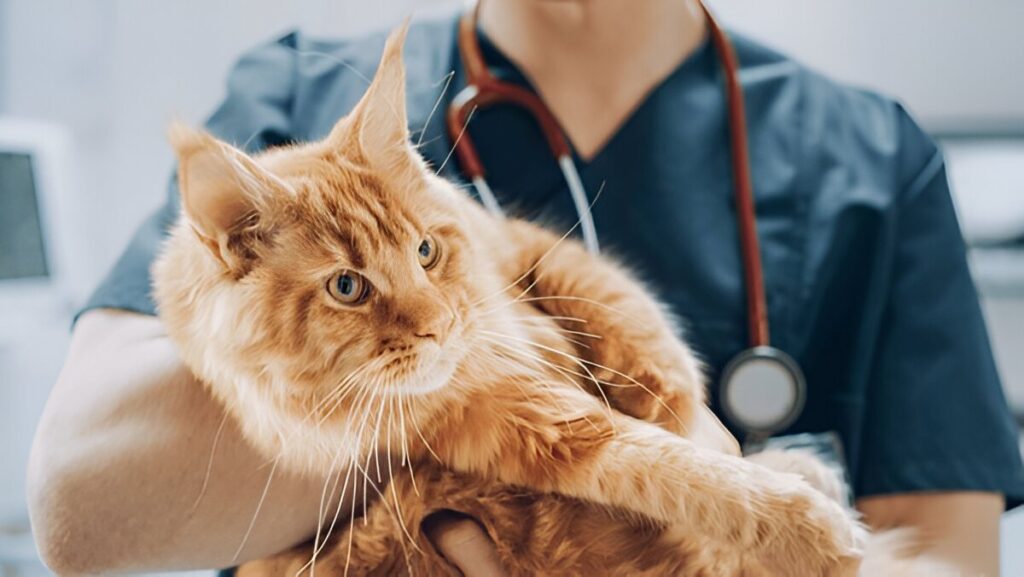
Health: Proactive Care for Longevity
When we brought Finn home, our breeder was very transparent about the health risks associated with Maine Coons. It is important to keep these things in the back of your mind so that you are proactive.
Common Health Issues
Some things that Maine Coon owners should keep their eyes out for are:
- Hypertrophic cardiomyopathy (HCM): A common heart condition that can be found in many cat breeds.
- Hip dysplasia: This occurs when a cat’s hip joint doesn’t quite take shape.
- Spinal muscular atrophy (SMA): A genetic neurological condition
- Polycystic kidney disease (PKD): A genetic kidney problem
The good news is that responsible breeders do genetic testing to ensure these problems are not passed down. And to be honest, the best thing we can give Finn is regular check-ups with our vet.
Finn goes to the vet every year, and I feel comfortable knowing that if there are any problems, we will catch them fairly early.
Dental and Ear Care
These things are often overlooked! Finn hates having his teeth brushed, but we try to brush his teeth a few times a week with special cat toothpaste to control tartar.
I always check Finn’s ears every few weeks to ensure they’re clean and healthy. It is cheap insurance for us to prevent a lot of misery and vet bills down the road.
Regular Veterinary Care
It is good practice to schedule an annual or bi-annual wellness exam for your Maine Coon. This will allow the veterinary team to monitor that your kitty’s overall health is in good standing, weight is in a healthy range, and check for early signs of genetics or age-related diseases.
Kittens will need to visit the vet more frequently, typically every 3-4 weeks, from a young age to about 4 months of age. Usually, adult cats can go in for a health check once a year.
Make sure to stay up to date on all vaccinations, for rabies, feline herpesvirus, calicivirus, and panleukopenia.
You also should provide year-round parasite prevention, including heartworm, fleas, and ticks.
Exercise and Enrichment
Although Maine Coons do not require unique exercise compared to other cats, it is important to provide an enriched indoor environment, when possible, filled with (cat) furniture, and plethora of toys, many of which stimulate activity and mental enrichment.
Although brief bursts of play and regular kitty-human contact have great benefits for your Maine Coons physical and emotional health.
RELATED POSTS:
How Long Can a Cat Go Without Eating?
How Well Do Maine Coons Get Along with Dogs
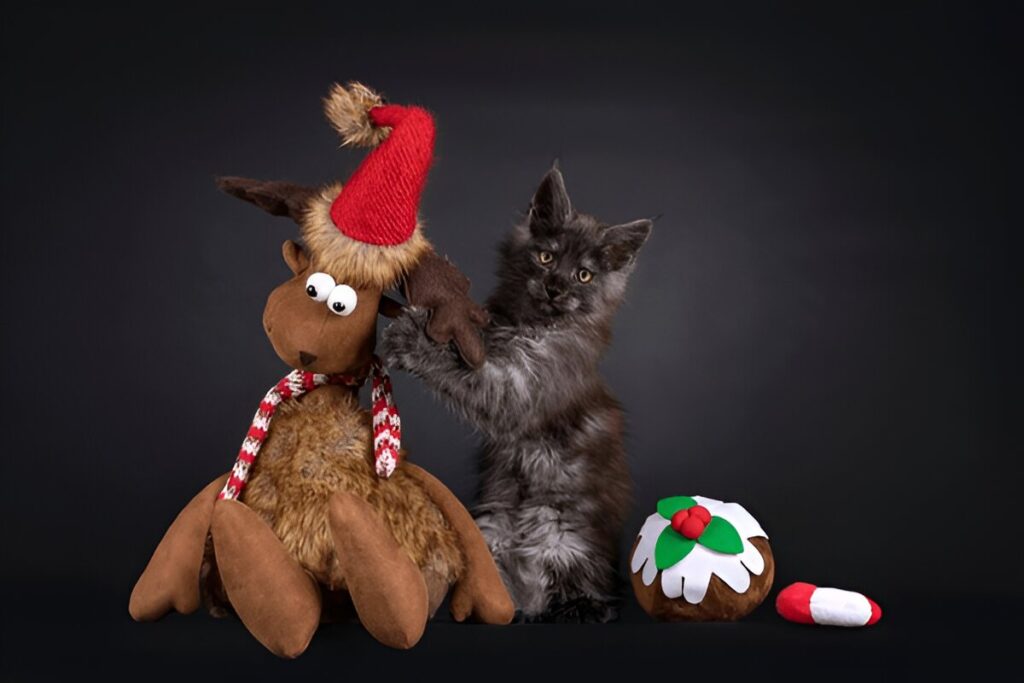
Grooming Routine for Maine Coon Kittens to Adults
Grooming a Maine Coon from kittenhood to adulthood means making a consistent commitment to help keep their long, thick and beautiful fur, prevent matting, and support their health.
This is a comprehensive guide to grooming your Maine Coon:
Starting Your Kitten Early
Begin grooming early and get the kittens used to being handled to decrease anxiety levels in their future grooming sessions.
Brushing should be gentle, using soft brushes or grooming mittens (e.g., Gloves that contain soft brushes on them). Focus on areas that are prone to mats, mainly behind the ears, under the chin, paws, and other areas that may collect debris.
Once a week or every two weeks will be suitable for kittens with a developing coat. Use a conditioning spray for coats that are thick and poofy to help stop mats.
Essential Grooming Tools
For the adult Maine Coon, brushing your coat two to three times a week is recommended for the following reasons: to remove loose hair and dander, limit tangles, and maintain a clean and healthy coat.
Since there are too many tools, investing in the right ones will make grooming less painful for both you and your cat, and much more effective.
- Wide-toothed: Great for getting through the thick undercoat as well as detangling larger knots.
- Fine-toothed: Great for snagging the smaller tangles as well as for those finishing touches.
- Slicker Brush: Has fine wire bristles that grasp the coat and reach deep to pull out loose fur, dander, and little mats without hurting the skin. It is best to get a self-cleaning slicker brush for easy cleaning.
- Dematting Comb: Especially designed to break up stubborn knots and mats, while minimizing pulling on the skin. Use cautiously and gently.
- Grooming Gloves: May be really great for cats who are sensitive to brushes because their actions are for petting rather than brushing, but you can pull the fur off. These are great for getting to difficult areas like their armpits.
- Nail Clippers: Maine Coons have strong claws that need to be suitably trimmed to prevent overgrowth. Growth prevents the normal retraction of claws, which leads to furniture damage and possibly kitty injuries. I recommend blunt-end scissors for cutting small mats in sensitive areas of your cat.
- Shampoo: If you have to give your cat a gentle bath, always use products for cats; human shampoos or conditioners may irritate their sensitive skin.
Bathing
Although Maine Coons are capable self-groomers, they may need a bath every once in a while, especially if they have gotten dirty or their coat is particularly greasy.
Only wash them when necessary (generally only once/month or every few months for an indoor cat). If you bathe them too much, it can strip off their natural oils.
Be sure to thoroughly brush your Maine Coon before bathing them to remove loose fur as well as existing mats. Water can tighten mats and make them more difficult to unmat afterwards.
Cost Comparison: Maine Coon Kitten vs. Adult Care
Owning a Maine Coon is an investment. But I can tell you, Finn is worth every penny I spent on him!
Below is a rough idea of the kind of multi-expense you can expect:
| Expense Category | Kitten (First Year) | Adult (Annual) |
| Food | $300–$500 | $400–$600 |
| Litter & Supplies | $200–$350 | $150–$250 |
| Vet Visits | $250–$500 (vaccines, spay/neuter) | $150–$300 (wellness exams) |
| Grooming Tools | $50–$100 | $30–$60 (replacement/maintenance) |
| Toys & Enrichment | $100–$200 | $50–$100 |
| Insurance | $200–$400 | $200–$400 |
| Total | $1,100–$2,050 | $980–$1,710 |
Disclaimer: Costs are rough estimates and can vary depending on your location and your cat’s needs.
Are Maine Coons high-maintenance?
I would say it is moderately high maintenance. They have long fur that requires regular brushing, they eat more than a normal cat, and you have to have some awareness about what is going on with their health.
Typical Maine Coons also need a fair amount of interaction. That being said, for all of the love and joy they give, it does not feel like work!
The Joy of Caring for a Maine Coon
Caring for Finn, my sweet, gentle giant, has been one of the most rewarding things I have ever done. Sure, they require a little more work than some other cats, especially with that lush coat and their request for interaction, but their love and joy for life are boundless.
Our Maine Coon’s playful antics, affection, and intelligence make all that effort totally rewarding. They become a true family member.
With some understanding, preparation, and tolerance, your Maine Coon will not just survive, they will thrive and bring your home endless purrs, cuddles, and happiness for many years.
References
- https://www.aafco.org/consumers/understanding-pet-food/selecting-the-right-pet-food/
- https://a-z-animals.com/pets/cats/cat-facts/what-do-maine-coon-cats-eat-2/
- https://www.aafco.org/wp-content/uploads/2023/01/Model_Bills_and_Regulations_Agenda_Midyear_2015_Final_Attachment_A.__Proposed_revisions_to_AAFCO_Nutrient_Profiles_PFC_Final_070214.pdf
- https://www.ufaw.org.uk/cats/maine-coon-hypertrophic-cardiomyopathy
- https://www.petmd.com/cat/conditions/musculoskeletal/c_ct_hip_dysplasia
- https://vgl.ucdavis.edu/test/maine-coon-sma
- https://journals.sagepub.com/doi/10.1177/1098612X13492164
